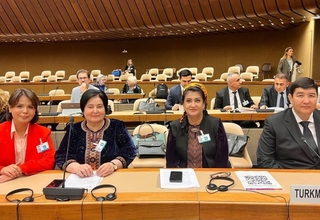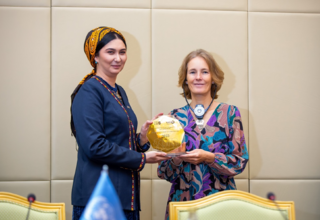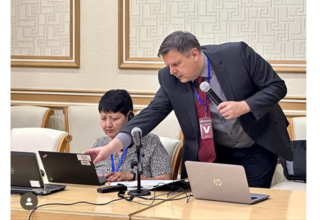Nearly 1800 school-children aged 15 years were surveyed in the capital city Ashgabat, as well as Dashoguz and Mary velayats (regions) to gauge the awareness of adolescents and identify their needs on youth-friendly services, as well as map out their knowledge level on overall healthy behavior.
The results of Health Behavior among Schoolaged Children (HBSC) pilot survey were presented at a roundtable, organized by the UNFPA, United Nations Population Fund and Ministry of Health and Medical Industry of Turkmenistan (MoH). The survey will serve as a baseline for the National Strategy on Children and Adolescent Health development.
UNFPA international expert Dr. Sergey Sargsyan presented and discussed the pilot survey results with the representatives of the relevant departments of MoH, Ministry of Education, State Statistics Committee of Turkmenistan, Youth Union and Women’s Union of Turkmenistan, National Institute of Democracy and Human Rights, Mejlis, as well as UNICEF and WHO.
Nearly 1800 school-children aged 15 years were surveyed in the capital city Ashgabat, as well as Dashoguz and Mary velayats (regions) to gauge the awareness of adolescents and identify their needs on youth-friendly services, as well as map out their knowledge level on overall healthy behavior. The initiative underlined the importance of the inter-agency cooperation, as the Ministry of Education played a key role in MoH’s successful implementation of the project through ensuring a high level of cooperation of the school authorities across the country.
Healthy youth continues to be a priority on the Government’s agenda in Turkmenistan, where people younger than 25 comprise nearly 50 percent of its population. In the recent years, the Government showed commitment to development of the National Strategy on Children and Adolescent Health. Therefore in 2011, in partnership with the Ministry of Health and Medical Industry of Turkmenistan (MOH), UNFPA successfully re-launched the work of the national Working group on development of the National Strategy.
The survey, developed with use of the WHO adopted HBSC methodology and regularly conducted in 43 countries, just got introduced to Central Asia. Successfully carried out in different parts of Turkmenistan, the survey data can also be used for cross-country comparative analysis and research.




